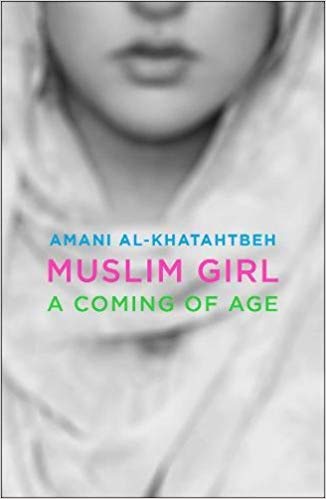Muslim Girl: A Coming of Age by Amani Al-Khatahtbet
Written by Kristy Dolson.
This September marks the 18th anniversary of the 9/11 terrorist attacks. As a sophomore in high school on that day, I understood that the world had changed. But as a white middle-class teenager in Canada, my immediate surroundings and future opportunities were largely unaffected. This was not the case for Amani Al-Khatahtbet, who was a child in New Jersey when 9/11 took place. The events of that day had life-changing consequences for her and thousands of other innocent children around the world.
Muslim Girl: A Coming of Age is the true story of how one girl had her life and future altered by the horrific events of September 11, 2001. Al-Khatahtbet grew up under the scrutinizing and racist gaze of an angered America, and was deemed guilty by association and refused a voice by the media around her. In response to this anger and isolation, she co-founded MuslimGirl.com to form connections between Muslim women. This website became a platform for the voices of thousands of girls and women who joined the new community. The founders insisted on a safe space for representation and support so that other girls growing up in a post-9/11 America would not have to experience the same pain and despair.

Published in 2017, this memoir is aptly timed. Fear-mongering and racist rhetoric have reached a fever pitch in the United States. MuslimGirl.com is a platform that allows its creators to use their Western media privilege to reclaim the narrative of Muslim women and to increase positive representation around the world in order to survive racist rhetoric and to make radical change in media and advertising policies. In a time that feels fraught with nationalist feeling and anti-Muslim bigotry, it is reassuring that influencers like Al-Khatahtbet are seeking to raise awareness of the harmful effects these and other policies can have on the lives of American youth.
This book was written to bring more awareness to her website, but also as a memoir of Al-Khatahtbet’s experiences. Written in the first person, it uses a lot of short sentences to facilitate an intimate, conversational tone. The conversations with her father about feeling pride in her identity and standing up for herself against the expectations of her peers are especially poignant. These are welcoming anecdotes for young readers looking for strong role models. Although it is very short, there is a lot of material to cover, as she moves between growing-up stories to present-day observations in her struggle against racist stereotyping.
Although the tone is intimate, the memoir is often candid, blunt, and angry – as it should be. There were moments of discomfort for me. But that is why I read. If you are uncomfortable, you are learning. And I learned a lot from this reading experience. My most important takeaway was the danger of the “single story.” In our efforts to be diverse, we often fall into the “tokenization trap.” We need to be aware that people come from all walks of life, from different countries and generations, and no single story can ever be used to speak for the experiences of an entire people.
We should all be reading and listening more. We cannot undo the terrible events of our past. But we can learn from them, listen to the victims, and try to be better.
The Author
Kristy Dolson lived in South Korea for five years before taking a year off to travel, read, and spend time with her family in Canada and Australia. She holds a Bachelor of Education and now lives in Yeosu, where she splits her time between teaching at the new Jeollanamdo International Education Institute and reading as much as she can.




